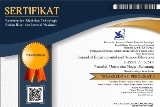Conservation of Gili Iyang, the Island with the Best Oxygen: An Ecophilosophical Perspective
DOI:
https://doi.org/10.15294/jese.v5i2.6353Keywords:
Conservation, Oxygen, Gili Iyang, EcophilosophyAbstract
Gili Iyang Island is one of the islands in Sumenep district, Madura Indonesia, which is known as the island with best oxygen after research by Lembaga Penerbangan dan Antariksa Nasional (LAPAN) with an average oxygen level of 20.9%. In 2022, there will be research by the Faculty of Advanced and Multidisciplinary Technology, Air Langga University which states that the oxygen level on Gili Iyang Island has an oxygen level of 20.3%. As a tourist village in Sumenep district, its existence is an attraction for tourists for oxygen tourism. How can the community and local government protect this area so that it remains sustainable? This research aims to see the extent to which the conservation of Gili Iyang Island is carried out using an ecophilosophy perspective. This research was conducted using a qualitative approach through data triangulation including interviews, observation, and documentation and supported by literature studies. The research results show that the people of Gili Iyang is quite good at protecting the nature of this island. There have never been any complaints about illegal felling of trees or pollution activities that have caused oxygen levels to drop significantly. Many trees grow abundantly on this island, while people's use of motorized vehicles is still relatively normal, and the cleanliness of the island at many points is also well maintained. Even so, wise behavior towards nature as taught by ecophilosophy must continue to be socialized and intensive education given to local communities. The eco-philosophy pattern implemented by the Gili Iyang community must be maintained and improved through sustainable conservation on the island they live on.
References
Badan Pusat Statistik. (2023). kecamatan Dungkek dalam Angka 2023.
Barbour, I. G. (2003). Juru Bicara Tuhan. Mizan.
BPS of Sumenep district. (2021). Kecamatan Dungkek dalam Angka 2021. In Badan Pusat Statistik Sumenep.
Cragg, L., Williams, S., & Chavannes, N. H. (2016). FRESH AIR: An implementation research project funded through Horizon 2020 exploring the prevention, diagnosis and treatment of chronic respiratory diseases in low-resource settings. Npj Primary Care Respiratory Medicine, 26(March), 1–5. https://doi.org/10.1038/npjpcrm.2016.35
Hategan, V. P. (2021). Promoting the eco-dialogue through eco-philosophy for community. Sustainability (Switzerland), 13(8), 1–19. https://doi.org/10.3390/su13084291
Haydock, K., & Srivastava, H. (2019). Environmental philosophies underlying the teaching of environmental education: a case study in India. Environmental Education Research, 25(7), 1038–1065. https://doi.org/10.1080/13504622.2017.1402170
Heffron, J. M. (2022). Soka education and the land ethic: educational leadership toward the ‘creative co-existence of nature and humanity’[1]. Environmental Education Research, 28(3), 476–490. https://doi.org/10.1080/13504622.2022.2045255
Karamova, K. H., Mukhametshin, A. A., Makhmutova, M. M., & Usmanov, S. F. (2019). Role of the “Green” Philosophy and Bionics on the Development of EcoDesign Clothing. Helix, 9(4), 5204–5207. https://doi.org/10.29042/2019-5204-5207
Lazuardi, A. Q., Lestari, P. A., Nadhifa, N. H., Da’i, R. A. N. R., & Rosanti, D. E. (2022). Mewujudkan keharmonisan antara manusia dan alam: panduan dasar pendidikan islam untuk mencintai lingkungan. AICOMS: Annual Interdisciplinary Conference on Muslim Societies, 2(1), 25–35.
Masykur, Z. M., Ni’am, S., & Naim, N. (2023). Scientia Sacra Seyyed Hossein Nasr Perspektif Filsafat Lingkungan dan Kontribusinya pada Pengembangan Kajian Ekologis. Substantia: Jurnal Ilmu-Ilmu Ushuluddin, 25(2), 166–183.
Megantoro, P., Kusuma, H. F. A., Perkasa, S. D., Syahbani, M. A., Salmahuda, M. K., Rachmadani, B. F., Apsari, R., Nugraha, Y. U., Ghani, M., & Prastio, R. P. (2024). Analysis distribution of oxygen and carbon dioxide concentration as air quality indicators in Gili Iyang Island, Madura, Indonesia. AIP Conference Proceedings, 3047(1). https://doi.org/10.1063/5.0194116
Molina-Motos, D. (2019). Ecophilosophical principles for an ecocentric environmental education. Education Sciences, 9(1). https://doi.org/10.3390/educsci9010037
Musleh, M., Subianto, A., & Prasita, V. D. (2023). Stakeholder Interaction in the Development of Oxygen Ecotourism on Gili Iyang Island, Indonesia. Journal of Government and Civil Society, 7(2), 297. https://doi.org/10.31000/jgcs.v7i2.8251
Nasr, S. H. (2003). Islam Agama, Sejarah, dan Peradaban. Risalah Gusti.
Okpoko, M. O. (2022). ‘Interconnectedness with Nature’: The Imperative for an African-centered Eco-philosophy in Forest Resource Conservation in Nigeria. Ethics, Policy and Environment, 25(1), 21–36. https://doi.org/10.1080/21550085.2020.1848190
Pusat, S., Dan, S., & Atmosfer, T. (2006). Kajian Potensi Wisata Kesehatan Oksigen Di Gili Iyang. Kajian Potensi Wisata Kesehatan Oksigen ... (Sumaryati), 83–90.
Rizal, M., & Alting, M. G. (2023). Teori Alam Dalam Filsafat Pendidikan Islam : Sebuah Teori Manajemen Waktu Dalam Penciptaan Alam. 20, 227–243. https://doi.org/10.46781/al-mutharahah
Sayem, M. A. (2019). The Eco-Philosophy of Seyyed Hossein Nasr: Spiritual Crisis and Environmental Degradation. Islamic Studies, 58(2), 271–295.
Setiawan, A. (2021). Menghirup Oksigen Terbaik Sepuasnya di Gili Iyang. Indonesia.Go.Id.
Shanmugapriya, K., & Christopher, G. (2023). Eco-philosophy of Indian classical fables. Ecocycles, 9(1), 100–106. https://doi.org/10.19040/ecocycles.v9i1.286
Siburian, R., Savitri, M., Bagir Abidin, Z., Mangunjaya, F., & Sila Adlin, M. . (2021). Modul Pelatihan Agama, Pelestarian Lingkungan, dan Pemulihan Ekosistem Gambut.
Swaradesy, R. G. (2020). Konsep Kebersihan Masyarakat Kampung Naga Dalam Perspektif Eco-Philosophy. WASKITA: Jurnal Pendidikan Nilai Dan Pembangunan Karakter, 4(1), 27–39. https://doi.org/10.21776/ub.waskita.2020.004.01.3
Yuliaty, C., Kurniasari, N., Triyanti, R., & Zulham, A. (2021). Stakeholders role in economy creative development of maritime culture in alor regency. IOP Conference Series: Earth and Environmental Science, 744(1). https://doi.org/10.1088/17551315/744/1/012107.
